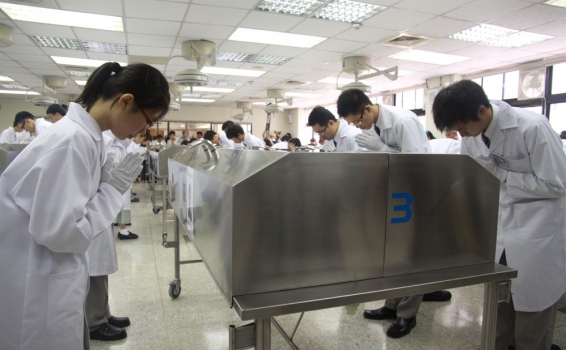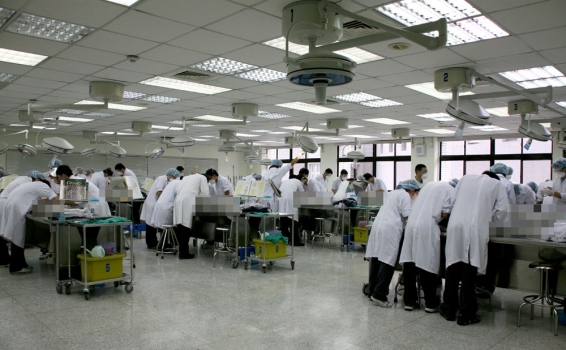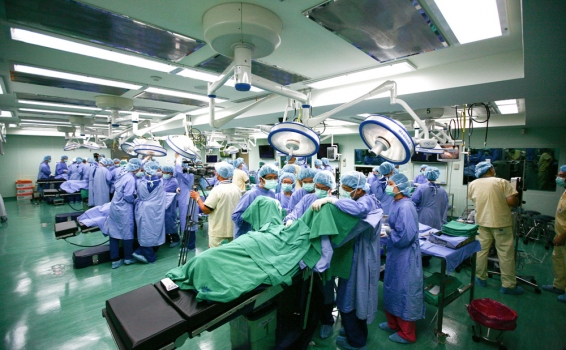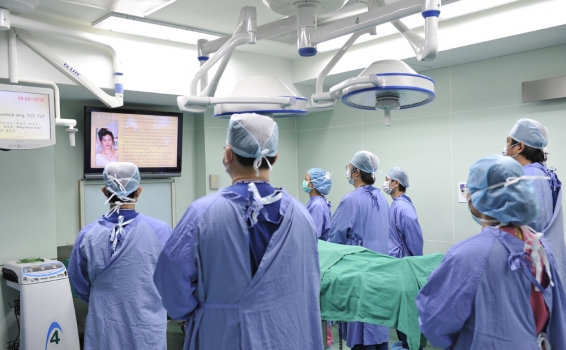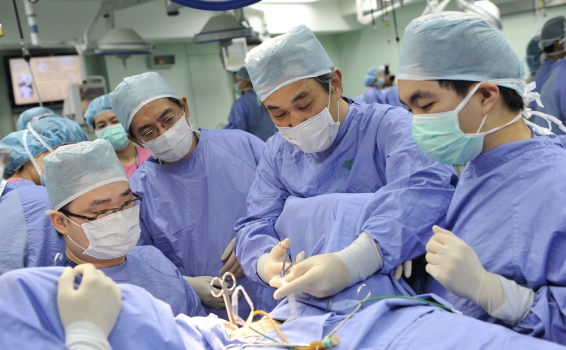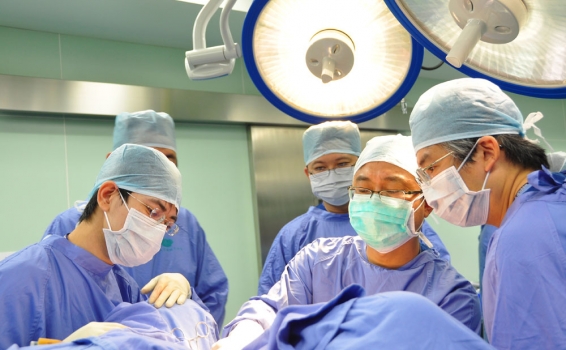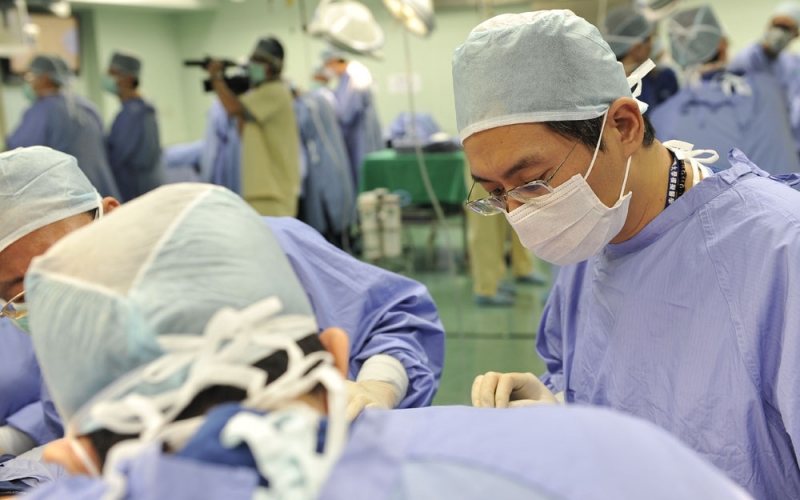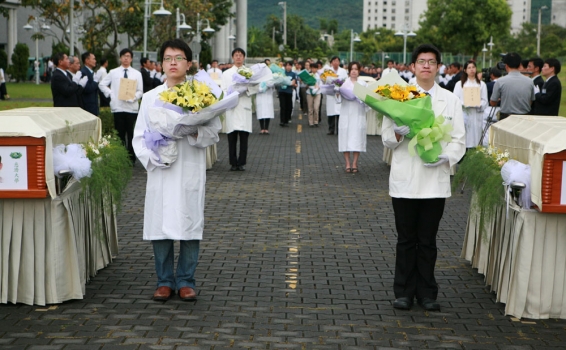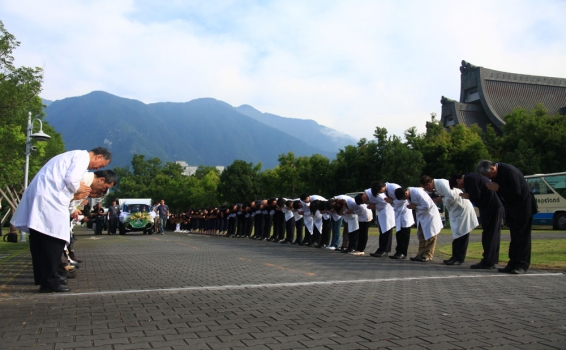15th Anniversary of Tzu Chi Body Donation for Anatomy and Simulation Surgery
The beginning of life is full of joy. Yet, the end of life is usually full of unwillingness and emotion. However, when extension of physical life is no longer feasible, A possibility exists that the meaning of life can be extended.
After homemaker Hui-Min Lin donated her body and became Tzu Chi’s very first Great Body donor, Dharma Master Cheng Yen respectfully called the full body donation Bodhisattvas as “Silent Mentor”. For medical doctors and medical students, what they gain from the Silent Mentors is not just the opportunity to unveil the mystery of the human body structure, but also learn to appreciate and respect the patients and their families.
One may recall that in the pre-renaissance age, dissecting of human could only be performed in silent and pilfering environments. Now, with the whole body donation, Tzu Chi lets the Silent Mentor be the instructor of the anatomy class, and further developing the clinical breakthrough technique of simulation surgery.
In the last fifteen years, over thirty thousand persons in Taiwan signed an agreement for whole body donation, more than seven hundred and fifty Silent Mentors, witness by their family members, fulfilled their wishes of : Donating the useless body for medicine to gain a better understanding for saving life and guarding health.
Written by Shun-Pin Yang and Wanlin Wu
Chao-Jung Chiu, female, over fifty year of age, family doctor, nicknamed “Mama Chiu” by the Kuanshan Tzu Chi Hospital. Practiced medicine for nineteen years covered all over the Eastern Taiwan Mountainous areas. She was called “Gee-Na”, meaning “Tribe Mother”, by the native Bu-Nun tribe. Dr. Chiu died of relapsed of her liver cancer. She willed to “Give” her silent body and wish to contribute to the further understanding of human bodies.
Following the footsteps of many forefathers of medical sciences in Taiwan, Doctor Chao-Jung Chiu used her own body to teach her last class. On September 14, 2011, the one hundredth school year of Tzu Chi University, the body of Dr. Chiu was among the twelve Great Body Teachers unveiled in the anatomy class. She was the first doctor from Tzu Chi Mission of Medicine who gave her own body to continue her contribution in medical education. She was also the two hundred and fifteenth Silent Mentor in the fifteen-year history of the Anatomy class of Tzu Chi University and Tzu Chi College of Technology.
Gave Her Own Body to Enrich Life and Solidify Medical Education
Pushing back the calendar for a few days, on September 9-12, 2011, the Tzu Chi Annual International Human Doctors Conference was held in Hualien, Taiwan. The joint session of simulation surgery workshop was entering its last session on September 12. The workshop was jointly organized by the ENT Department, the Colon and Rectal Surgeons Department, the Urology Department, the Skull Base Medicines Association and the Urinary Incontinence Association.
The chief organizer was Dr. HannChorng Kuo, head of the Urology Department, Hualien Tzu Chi Hospital. Dr. Kuo indicated that the subject of the last day would be concentrated in treatment of urinary incontinence caused by prolepses of organs in the pelvic cavity. Even though it is a minor procedure, however, if inadequately performed could result in major damage to the patient, such as injury in artery and/or nerve system. Therefore, many senior as well as young physicians took advantage of this opportunity to practice the technique.
Dr. Hann-Chorng Kuo pointed out that in the past, medical students could only be observers during an operation, rarely having the opportunity to be participants. Under such a system, it is very difficult for the junior doctors to gain and cumulate their sophisticated surgical experiences. Now, with the great body teachers provide a perfect channel for doctors to gain valuable experiences. This way, not only the doctors learn the procedure, the post-surgery review can also provide valuable information on the precision and adequacy of the procedure. Dr. Kuo said,”In most medical organizations, simulated operation on a body are limited to demonstrations. That is to say, the students can only observe while the instructor demonstrates. Here, we let the students be the sole surgeons in a simulated great body surgery.” Dr. Ming-Kun Lai, former chief of the urology department of Taiwan University is an experienced surgeon and has conducted many kidney operations. He was at the conference as a student to gain hand-on experience.
During the month of September, 2011, Tzu Chi University conducted three series of Great Body Teacher workshops. These included a simulated surgery class for the seventh grade medical school students, a joint simulated surgery class for international humane doctors, and an anatomy class for the third grade medical school students.
A Thought of Great Giving Leads to Medical Wisdom
In its second year, Tzu Chi University received its very first Great Body for anatomy classes from Ms. Hui-Min Lin in 1995. Answering the call of Dharma Master Cheng Yen, by the end of the same year there were more than four hundred pledges of great body donations.
Professor Guo-Feng Tseng of Tzu Chi University implemented a procedure of “cryopreservation that rapidly freezes the dead body without using preservatives”. This way, the muscles and vessels can resume their elasticity when the body is thawed back to normal temperature, just like patients when awakened from anesthesia. This was the first “simulated great body surgical procedure” practiced by doctors and interns. This was also a giant step to prove the theory of great body application and significantly enhanced the clinical value and medical research of great body.
The body of Doctor Chao-Jung Chiu was preserved with great respect, and used for the anatomy classes. For an entire semester, students used the great body to visualize the muscle tissues, the locations of vessels and nerves. This class is the most fundamental lesson to understand the human bodies, before surgeons make their first knife cut.
Now, “simulated surgery” is considered as the first knife for a student to become a doctor, as well as a key step to cross from theoretical to clinical medicine. It became a requirement for all sixth and seventh year Tzu Chi medical school students, after they become interns.
Since the bodies of Silent Mentors were rapidly frozen, without using preservatives, once thawed there is a window of only four days for simulated surgery. Because the skin texture of the Silent Mentor is almost like that of live person, senior attending physicians can also use it for surgical lectures to the resident doctors and more junior doctors. In many occasions, the tissues can also be used for improvement of old surgical procedures as well as research for new procedures.
To this day, there were one hundred seventy five Silent Mentors donated their body for simulated surgery.
The First Medical Simulation Center Attracting International Attention
Doctor Ming-Che Lee, Surgery Department Director of the Tzu Chi Hospital in Hualien, said,”The most important rule for a surgeon is that there is always only chance. He has no opportunity for correction.” Therefore, no patient is willing to be under the “first knife” for a fresh surgeon. In the old days, young doctor would just stand next to the senior doctor and waiting for their opportunity for practice. Every time he applies his knife is a risk.
The Tzu Chi University Medical Simulation Center started in 2008. It is the first Medical Simulation Center in Taiwan. In the center, Professor GuoFeng Tseng insisted that all instruments and equipments must be as good as those used in the hospital. Be it a surgical table, a cantilever monitor, an endoscopy…the center will not use any surplus of the hospital, no compromise. This became the fortitude of the Center, and because of such fortitude, this is the only Medical Simulation Center in Taiwan.
In the past, to study advanced surgical procedure, a surgeon must spend his/her own money and study abroad. This is a very expensive venture, spending hundred of thousands of NT$ to learn a small block of a human body. Since the opening of Tzu Chi Medical Simulation Center, students are now no longer just trained in the fundamental clinical skills, including tracheotomy and chest tube drainage. The Center also opens up the opportunity to work with international academic institute and specialist associations, for surgeons to study more advanced procedures, such as endoscopic and microsurgery. Great body teachers not only provide first hand experience for students, but also let the senior doctors to refresh their skill and pass their experience of more complicated procedures to younger physicians.
In the earlier part of 2010, the Urological Association of Asia, for the first time, organized a series of lectures in Taiwan. The Association also anticipated that Taiwanese could offer workshops to share their expertise. Director of the Tzu Chi Hospital Urology Department, Dr. Hann-Chorng Kuo, seriously reviewed the situation and found that medical simulation is the key for doctors’ improvements and innovations. However, most of the medical simulation facilities around the world utilize simple body blocks or even pieces of corpse for teaching. In this respect, Taiwan lacked the proper hardware and software. Only Tzu Chi Medical Simulation Center has the modern and completed facilities. Besides, Tzu Chi utilizes “whole body”, Great Body Teachers, for “simulation”. In addition, Tzu Chi humanities are unique not only in Asia but also all over the world. Under the “respect life and no fee” directive from Dharma Master Cheng Yen, Tzu Chi Medical Simulation Center opened for the Urological Association of Asia for surgical simulations. This event received broad acceptance and accolades from international medical communities.
In 2011, the Tzu Chi International Medical Association again sponsored great body surgery simulation at their annual conference. In addition to the Urological Department, Deputy Superintendent of the Tzu Chi Hospital, Dr. Peir-Rong Chen, also invited personnel from the ENT Department, skull base surgery association of the neurosurgical department, and colon and rectal surgery department to participate in this great event.
Learning Never Ends; Values and Skills Fill the Hearts of Doctors
Dr. Chia-Hsiang Lin, head of urological department, E-Da Hospital, Kaohsiung, attended the 2010 simulated surgery during the Urological Association of Asia Lecture. He was very impressed. In September of 2011, Dr. HannChorng Kuo invited Dr. Lin to serve as instructor of laparoscopic surgery. The next day, he became a student under other instructors. Medical science is a continuing improvement process; learning does not become less important because of position and age.
With more than twenty years of practical experience, and is one of the authoritative expert in laparoscopic, Dr. Lin entered the class with sincerity. This is because he doesn’t consider pelvic and incontinence as his expertise. Furthermore, Dr. Lin thinks that teaching is part of his job in the hospital, he wants to utilize this opportunity to gain the additional experience of teaching-learning interaction. Being a good observer in a class as a student will make him a better teacher. Dr. Lin also thinks that as a student can learn in a more relaxed manner, which will help him grasp deeper the humanity of medical sciences. Dr. Lin indicated that after returning to his hospital, he will urge his students to register the Tzu Chi Medical Simulation class to improve their medical skill.
“Humans make mistakes. Hopefully, Simulation Surgery can minimize human error in medical operations.” Dr. ChiaHsiang Lin realized that simulation surgery is different from animal test. It is almost like real operation, the steps are also following the real surgery. With practice, a doctor is more vigilant and calm when facing a live patient, as well as communicating with the patient’s family.
Doctor Huang-Jen Lai, Colon and Rectal Surgeon of the Tzu Chi Hospital in Hualien, said, “In order that my right hand and left hand have the same level of skill, I force myself to eat with my left hand and handling all daily errands with my left hand. However, not all the maneuvers are as effective as those I learned from the great body teacher. With ‘Silent Mentor’, I can repetitively practice my minimally invasive laparoscopic surgery. With these practices, I will have no difficulty when confronting my patients.”
Indulge in Great Love, Learn to Respect Life
Not only to improve the medical science, Lin also said that the Tzu Chi Great Body surgery simulation class is unique on this earth. It provides a great opportunity in medical education. In the past, medical students had very little feeling of anatomy courses. Especially for the whole body, they did not have a real chance to touch a surgical knife. When they actually become a doctor, the young surgeons are not the choice of common patients. Therefore, the experiences are gained silently through observation.
Dr. Bin Chiu, a physician from the Far Eastern Hospital, signed up the class for the second time in 2011. Just for the purpose of continuing education, Chiu said he was very pleased to be part of this valuable event for the second time. During the course of the event, not only Chiu learned to improve his surgical skills, he also deeply impressed with the medical humanity that is part of Tzu Chi medical education.
Chiu said, “The respect of life, the spirit of great love, willing to donate ones own body for education causes, they are just like our teacher.” In the traditional anatomy class, a cadaver was viewed not more than a ‘tool’. Only in Tzu Chi, they great body is solemnly respected as a teacher. That is true humanity. The spirit of “rather suffer tens of wrong cuts on my body to avoid a single mistake on the patient’s body” is behind every donor’s mind of great body. This is a great contribution of the Silent Mentors. Chiu also said that on the surface a doctor learned surgical skills and techniques to reduce the risk in future operations. However, more than medicine, the doctors also learned the meaning of sacrificing one body for the benefit of others. Chiu viewed that the respect of life and the unselfishness of the great body could be more valuable than medical knowledge. With this in mind, a doctor can easily better communicate with his patients.
Great Giving Creates Humane Doctors
Since the start of the Great Body Teacher program, there have been more than 30,000 pledged donors. Over 700 donors completed the wishes for simulation surgeries. Among them, with the consent of the donors’ family members, 295 great body teachers were transferred to medical schools of Taiwan University, Cheng-Kung University, Kaohsiung Medical University, Chung Shan Medical University, China Medical University - Taiwan. This becomes a significant breakthrough of medical education in Taiwan.
Great Body Surgery Simulation provides solid theoretical and practical training for the third to seventh year Tzu Chi medical students. The program also gained its reputation among medical students internationally. As of today, 338 visiting scholars attended the program including personnel from Indonesia University, Queensland University, Taiwan Urology Association, Taiwan Urinary Incontinence Prevention Association, Asian Urology Association, Taiwan Skull Base Surgery Association, Taiwan Colon and Rectal Surgery Association, and Taiwan Plastic Surgery Association. In addition, about 1,704 cases directly benefited doctors from the Tzu Chi Mission of Medicine from the program.
Silent Mentors Program Stimulates Medical Excellency
Director Hann-Chorng Kuo indicated that enthusiastic feedback was gathered after each surgery simulation. Currently, the Tzu Chi Medical Simulation Center is the only such center in Taiwan. Kuo also emphasized that simulated surgery is a very important link in the training of surgeons. Not only young doctors mature through such a process, it can also avoid unnecessary injury to the patients. Great body anatomy and surgery simulation is marching into maturity. The task ahead is to promote the technology, and in turn, through this approach, advance medical education, humanity education and continuing education.
With excellent results and feedback, Kuo envisioned that great body surgery simulation becomes a required training for resident doctors and a pre-requisite for any specialist. With hands-on surgery, interaction with the great body teacher and humanity experience are the keys to become a good physician.
Thanks for the great “giving” of the Silent Mentors and their families, which render great “receiving” to the hearts of doctors and students that becomes the inexhaustible energy for the advancement of medical sciences. Responses and evaluations from many medical associations are currently in progress. Hopefully, the great love of silent body teachers can spread and make their ultimate contribution to the medical community in Taiwan and brightens the international medical society
Statistics of body donation of the Tzu Chi Medical Simulation Center
1. Completed body donation: 752 (February 1995 to October 2011)
2. Inter-school body donation transfers: 295 (transfer started in 1996)
3. Body donation used in anatomy: 215 (September 1996 to October 2011)
4. Body donation used in surgery simulation: 175 (May 2002 to October 2011)
5. Doctors from Tzu Chi Medical Mission participated in surgery simulation: 1704 persons and/or cases
6. Doctors from other medical institutes participated in surgery simulation: 337 persons and/or cases

